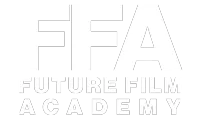FFA BLOG

AI Tools to Assist with Fundraising, Distribution, and Marketing in the Film Industry
The film industry is undergoing a major transformation with the integration of artificial intelligence (AI), reshaping how filmmakers approach every stage of production, from funding and distribution to marketing and audience engagement. AI-powered tools are streamlining traditionally time-consuming processes, enabling filmmakers to make data-driven decisions, personalize promotional efforts, and unlock new revenue streams. Whether it’s automating tedious tasks, optimizing marketing strategies, or predicting audience trends, AI is becoming an essential asset for independent filmmakers and major studios alike. Understanding how to leverage these advancements can give you a competitive edge, helping you navigate the evolving landscape of modern filmmaking. Here's how you can harness AI to enhance your filmmaking journey:
Fundraising with AI
AI is revolutionizing film financing, offering filmmakers innovative ways to secure funding and optimize their pitches.
AI-backed film funds:
Runway’s Hundred Film Fund: This initiative is real and offers grants ranging from 5,000 to 1 million for filmmakers who incorporate AI into their projects. Runway, a company known for its AI-powered creative tools, launched this fund to encourage the use of AI in storytelling and production. However, it’s worth noting that the fund is highly competitive, and filmmakers must demonstrate a clear and innovative use of AI in their projects to qualify.
Other AI-backed initiatives: While Runway is a prominent example, other AI-focused funds and grants are emerging. For instance, companies like StoryFit and Cinelytic are also exploring AI-driven financing models, though they are more focused on data-driven decision-making than direct funding.
AI-powered pitch optimization:
Filmustage: This platform uses AI to analyse scripts and generate detailed breakdowns, synopses, and risk analyses. It’s particularly useful for pre-production, helping filmmakers present a polished and data-backed pitch to investors. Filmustage raised $1.5 million in seed funding in 2022, validating its potential in the industry.
Other tools: Platforms like ScriptBook and Largo.ai also offer AI-driven script analysis, providing insights into a film’s commercial potential, target audience, and even casting suggestions. These tools can significantly enhance a filmmaker’s ability to secure funding by presenting a data-driven case for their project.
Budget estimation:
AI tools like Cinelytic and CineGrid are being developed to assist with budget estimation. These platforms analyze historical data from similar projects to provide accurate financial projections, helping filmmakers present realistic budgets to investors. While still in their early stages, these tools are gaining traction in the industry.

Distribution Strategies
AI is transforming film distribution by enabling data-driven decisions that maximize audience reach and revenue potential. Here’s a closer look:
Audience targeting:
AI algorithms can analyze viewer preferences, behaviors, and demographics to identify the most suitable platforms and release strategies for a film. For example, Netflix and Amazon Prime use AI to recommend content to users, and filmmakers can leverage similar tools to target their ideal audience.
Companies like Largo.ai and Prelude offer AI-driven audience insights, helping filmmakers tailor their distribution strategies to specific markets and demographics.
Release optimization:
AI can analyze vast amounts of data on past releases to predict optimal release windows and platforms. For instance, Cinelytic uses AI to recommend release dates based on factors like competition, seasonality, and audience trends. This can help filmmakers avoid crowded release schedules and maximize their film’s visibility.
AI-Enhanced Marketing
AI is revolutionizing film marketing by enabling personalized campaigns, optimizing trailers, and providing real-time feedback on audience reactions. Here’s a deeper dive:
Personalized marketing campaigns:
AI tools like Albert and Pencil can create tailored marketing content for different audience segments. For example, AI can generate customized social media ads, email campaigns, and even posters based on user data. This level of personalization can significantly increase engagement and ticket sales.
Trailer optimization:
AI platforms like Pictory and Wibbitz can analyze successful trailers and suggest edits or scenes to include for maximum impact. These tools use machine learning to identify patterns in viewer engagement, helping filmmakers create more compelling promotional material.
Social media analysis:
AI tools like Hootsuite Insights and Brandwatch can monitor and analyze social media reactions to marketing efforts. This allows filmmakers to make real-time adjustments to their campaigns based on audience reception. For example, if a particular trailer is receiving negative feedback, AI can identify the issue and suggest improvements.
Film Flow: The All-in-One AI-Powered Marketing Solution
Unlike standalone AI tools that focus on specific aspects of marketing, the Film Flow App offers a comprehensive approach by combining data analytics, social media tracking, audience insights, and campaign performance monitoring into a single, user-friendly platform. Filmmakers can:
Track marketing efforts across multiple platforms.
Analyze audience reactions in real-time.
Receive AI-driven recommendations to improve engagement.
Optimize content strategies based on actual performance metrics.

Leveraging AI Platforms
To fully harness the power of AI in filmmaking, it’s essential to explore and integrate AI tools into every stage of the production process. Here’s how:
AI-integrated pre-production tools:
Platforms like Filmustage and ShotPro streamline pre-production by automating tasks like script breakdowns, scheduling, and budgeting. These tools not only save time but also make projects more attractive to investors and distributors.
AI for content analysis:
Services like Largo.ai and ScriptBook offer AI-driven insights into a film’s potential, from audience demographics to casting suggestions. These insights can inform creative decisions and strengthen investor pitches.
Staying informed about AI film funds:
Initiatives like Runway’s Hundred Film Fund are just the beginning. As AI continues to evolve, more funding opportunities are likely to emerge. Filmmakers should stay informed about these developments by following industry news and participating in AI-focused film festivals and competitions.
Additional Considerations
While AI offers numerous benefits, it’s important to approach its use thoughtfully:
Ethical concerns: The use of AI in filmmaking raises ethical questions, particularly around data privacy and the potential for AI to replace human creativity. Filmmakers should be transparent about their use of AI and ensure that it enhances, rather than detracts from, the creative process.
Cost and accessibility: While some AI tools are affordable, others can be expensive, potentially creating barriers for independent filmmakers. It’s important to weigh the costs and benefits of using AI and explore free or low-cost alternatives where possible.
Learning curve: AI tools often require a learning curve, and filmmakers may need to invest time in training and experimentation to use them effectively. However, the long-term benefits in terms of efficiency and creativity can outweigh the initial effort.
AI is undeniably transforming the film industry, offering filmmakers new opportunities in fundraising, distribution, and marketing. By embracing these tools, filmmakers can streamline their processes, make data-driven decisions, and access new funding sources. However, it’s crucial to approach AI thoughtfully, considering ethical concerns, costs, and accessibility. As the technology continues to evolve, staying informed and adaptable will be key to leveraging AI’s full potential in the film industry.
Studio 202 | Mainyard Studios | 280 Mare St | London | E8 1HE | UK
+44 7360 268742
hello@futurefilmacademy.com
www.futurefilmacademy.com

